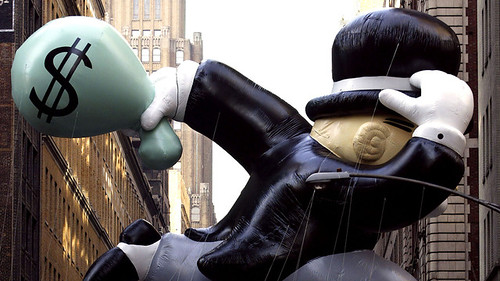Sadly, Wall Street's financial giants have learned nothing from Occupy Wall Street. Once again they have reverted to old predatory ways and are seeking to reap profits from those who can least afford to be targeted to have a single hard-earned dollar milked out of their pockets.
Via:
“I may as well have gone to a payday lender,” said Mr. Wegner, a 36-year-old nursing assistant in Minneapolis, who ended up choosing a local branch of U.S. Bank and avoided the payday lenders, pawnshops and check cashers lining his neighborhood.
Along with a checking account, he selected a $1,000 short-term loan to help pay for his cystic fibrosis medications. The loan cost him $100 in fees, and that will escalate if it goes unpaid.
An increasing number of the nation’s large banks — U.S. Bank, Regions Financial and Wells Fargo among them — are aggressively courting low-income customers like Mr. Wegner with alternative products that can carry high fees. They are rapidly expanding these offerings partly because the products were largely untouched by recent financial regulations, and also to recoup the billions in lost income from recent limits on debit and credit card fees.
...
“It is a disquieting development for poor customers,” said Mark T. Williams, a former Federal Reserve Bank examiner. “They are getting pushed into high-fee options.”
That $1,000 short-term loan if paid on the due date will cost Mr. Wegner $1,100, or a typical $10 for every $100 borrowed. The loans are offered as an advance on direct-deposit paychecks. On the due date, the amount owed is automatically deducted from the borrowers account whether there's enough money to cover it or not, which can lead to overdraft and other fees tacked on to the balance "that translate into an annual interest rate of more than 300 percent, according to the Center for Responsible Lending."
And the banks are counting on consumers to miss their loan deadlines, that's where most of their profits will come from with most of these consumers with either lower incomes, or poor credit ratings. They've certainly created enough consumers with poor credit ratings through the foreclosure crisis.
Don't expect to escape these high debts you'll rack up by using their "services," *cough* because remember now the new bankrupcty law of 2005 -- that was pushed by the banks -- eliminating some exemptions, raising legal fees, requiring credit counseling at an additional cost, and moving many from Chapter 7 to Chapter 13 with a long road to repayment.
Prepaid cards are also a new lure for lenders as they are not restricted by Dodd-Frank financial regulation law, leaving banks free to charge high fees each time a customer swipes their card. Banks are already under fire for not clearly disclosing the fees associated with their prepaid cards.
Customers with a “convenient cash” prepaid card from U.S. Bank, for example, pay a $3 fee to enroll, a $3 monthly maintenance fee, $3 to visit a bank teller and $15 dollars to replace a lost card.
Feeling special yet?
Banks have no shame. None. May Day can't come too soon and it can't last too long.


















